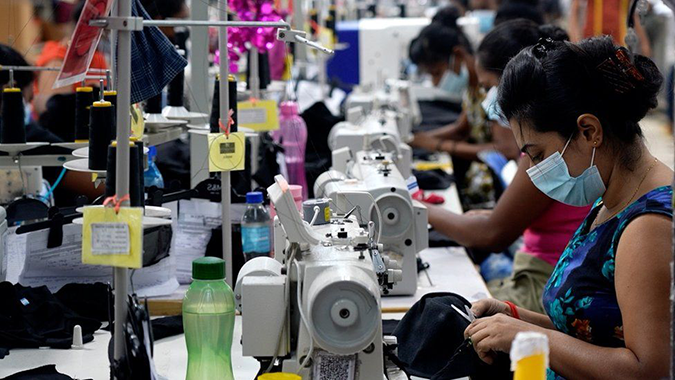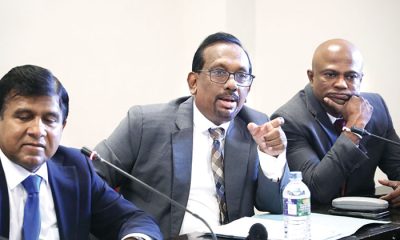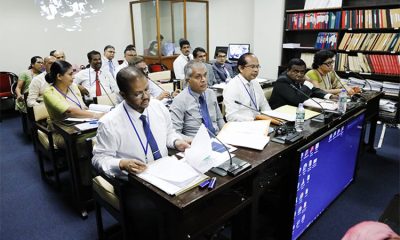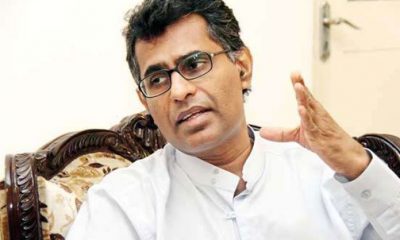News
JAAF opposes govt. move to abolish SVATs

questions timing, given current decline in exports
urges govt. to shield sector from unnecessary internal shocks
The Joint Apparel Association Forum (JAAF) has expressed its deep concerns and disappointment regarding a recent government decision to end the well-functioning Simplified Value Added Tax (SVAT) scheme.
Cabinet spokesman Minister Bandula Gunawardena last week disclosed that the Cabinet-of-Ministers approved a proposal by President Ranil Wickremesinghe, in his capacity as the Finance Minister, to draft a Bill to do away with SVAT, with effect from Jan 01, 2024. The Minister is on record as having told the post-Cabinet media briefing that this was done in line with the agreement with the International Monetary Fund (IMF)
JAAF has issued the following statement: “JAAF, representing the interests of the apparel industry, firmly believes that the abolition of SVAT for exporters will have detrimental effects on the sector, already reeling under the pressure of declining exports, jeopardizing the cash flows of businesses and impeding the efforts to return to overall growth.
The abolition of SVAT will create a further burden on an already stressed industry and, particularly, on company cash flows, as funds will be tied up in even the most efficient refund systems, JAAF stated, adding that the impulsive and non-consultative decision will have disastrous impacts on the long-term operations of a viable sector.
Whilst recognising the need for the Government to achieve its revenue targets. JAAF notes that the abolishing of SVAT is completely revenue neutral to the Department. Removal of SVAT will only lead to increased cash flow between the Exporter and the IRD. Sri Lanka’s track record on VAT refunds is poor and prior to the introduction of SVAT, exporters had refunds due from the Department that ran into over 18 months.
It is important to note that as history has shown, the refund system that existed before the introduction of SVAT had large fraud in the non-export sector, and not among exporting companies. Exporters utilize SVAT for the purchase of local inputs, which are subsequently converted into finished products for export. As such they have very little sales locally which reduces the potential for abuse of the system. In any event the likelihood of abuse is much higher in a system based on payment and refund as against a voucher system of SVAT.
Further, the decision has seemingly failed to consider the fact that apparel exporters may be compelled to import raw materials rather than purchasing them from domestic manufacturers and having their cash flows restricted by the VAT refund system. This will lead to increased imports, a detrimental effect on both the companies and the overall balance of trade. This will result in the loss of the unique vertical integration benefits Sri Lanka apparel has to offer, which over the long term may lead to questions being raised over the viability of companies and the jobs they create
Furthermore, the reintroduction of a VAT refund system, even under the most auspicious conditions, would necessitate the allocation of substantial Inland Revenue Department (IRD) resources for the constant follow-up and evaluation which a refund system will necessitate. This will only result in increased additional administrative costs for all parties and the misplacement of precious IRD resources and distracted staff.
Therefore, JAAF firmly recommends that the removal of SVAT from the export sector be approached with utmost caution. In the current climate of declining exports and its adverse effects on companies and employees, it is crucial to shield the sector from unnecessary internal shocks that would undoubtedly occur if SVAT were abolished, urging the Government to preserve SVAT for the export sector.”
News
US sports envoys to Lanka to champion youth development

The U.S. Embassy in Colombo welcomed the U.S. Sports Envoys to Sri Lanka, former National Basketball Association (NBA) and Women’s National Basketball Association (WNBA) players Stephen Howard and Astou Ndiaye, from June 8 through 14.
The Public Diplomacy section of the U.S. Embassy said that it would launch a weeklong basketball program intended to harness the unifying power of sports, made possible through collaboration with Foundation of Goodness and IImpact Hoop Lab.
While in Sri Lanka, Howard and Ndiaye, both retired professional basketball players, will conduct a weeklong program, Hoops for Hope: Bridging Borders through Basketball. The Sports Envoys will lead basketball clinics and exhibition matches and engage in leadership sessions in Colombo and Southern Province for youth aged 14-18 from Northern, Uva, Eastern and Western Provinces, offering skills and leadership training both on and off the court. The U.S. Envoys will also share their expertise with the Sri Lanka Basketball Federation, national coaches, and players, furthering the development of basketball in the country. Beyond the clinics, they will collaborate with Sri Lankan schoolchildren to take part in a community service project in the Colombo area.
“We are so proud to welcome Stephen and Astou as our Sports Envoys to Sri Lanka, to build on the strong people-to-people connections between the United States and Sri Lanka,” said U.S. Ambassador Julie Chung. “The lessons that will be shared by our Sports Envoys – communication, teamwork, resilience, inclusion, and conflict resolution – are essential for leadership development, community building, equality, and peace. The U.S. Sports Envoy program is a testament to our belief that sports can be a powerful tool in promoting peace and unity.”
News
Rahuman questions sudden cancellation of leave of CEB employees

SJB Colombo District MP Mujibur Rahuman in parliament demanded to know from the government the reasons for CEB suspending the leave of all its employees until further notice from Thursday.
MP Rahuman said that the CEB has got an acting General Manager anew and the latter yesterday morning issued a circular suspending leave of all CEB employees with immediate effect until further notice.
“We demand that Minister Kanchana Wijesekera should explain this to the House. This circular was issued while this debate on the new Electricity Amendment Bill was pending. There are many who oppose this Bill. The Minister must tell parliament the reason for the urge to cancel the leave of CEB employees,” the MP said.However, Speaker Mahinda Yapa Abeywardena prevented Minister Wijesekera responding to the query and said that the matter raised by MP Rahuman was not relevant.
News
CIPM successfully concludes 8th Annual Symposium

The Chartered Institute of Personnel Management (CIPM) successfully concluded the 8th Annual CIPM Symposium, which took place on 31st May 2024. Themed “Nurturing the Human Element—Redefining HRM in a Rapidly Changing World,” the symposium underscored the pivotal role of human resource management (HRM) in today’s dynamic global landscape. Since its inception in 1959, CIPM has been dedicated to advancing the HR profession through education, professional development, and advocacy, solidifying its position as Sri Lanka’s leading professional body for HRM.
Ken Vijayakumar, the President of the CIPM, graced the occasion as the chief guest. The symposium commenced with the welcome address by the Chairperson, Prof. Arosha Adikaram, followed by the Web Launch of the Symposium Proceedings and Abstract Book by the CIPM President. The event featured distinguished addresses, including a speech by Chief Guest Ken Vijayakumar, President of CIPM, and an address by Guest of Honor Shakthi Ranatunga, Chief Operating Officer of MAS Holdings Pvt. Ltd., Sri Lanka.
The symposium also featured an inspiring keynote address by Prof. Mario Fernando, Professor of Management and Director of the Centre for Cross Cultural Management (CCCM) at the University of Wollongong, Australia.
Vote of Thanks of the inauguration session was delivered by Dr. Dillanjani Weeratunga, Symposium Co-chair.
The symposium served as a comprehensive platform for researchers to present their findings across a wide range of critical topics in HRM. These included Cultural Diversity and Inclusion, Talent Development and Retention, Ethical Leadership and Corporate Social Responsibility, Adapting to Technological Advancements, Mental Health and Well-being at Work, Global Workforce Challenges, Employee Empowerment, and Reskilling and Upskilling.
The plenary session was led by Prof. Wasantha Rajapakse. Certificates were awarded to the best paper presenters during the valedictory session, followed by a vote of thanks delivered by Kamani Perera, Manager of Research and Development.
The annual symposium of CIPM was a truly inclusive event, attracting a diverse audience that spanned undergraduates, graduates, working professionals, research scholars and lecturers. This widespread interest highlights the symposium’s significance in the field of HRM, offering a unique opportunity for everyone to network and learn from scholarly brains.The CIPM International Research Symposium was sponsored by Hambantota International Port, Sri Lanka Institute of Information Technology (SLIIT), E B Creasy & Co. PLC, and Print Xcel Company.
























